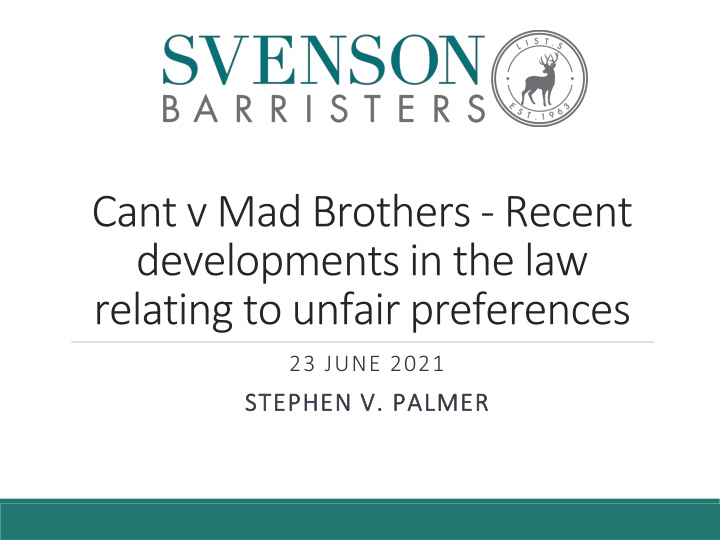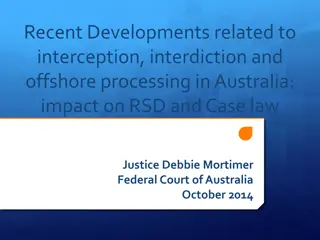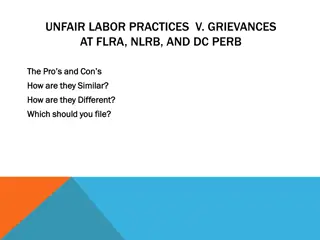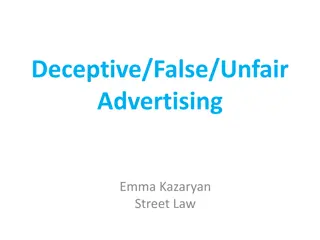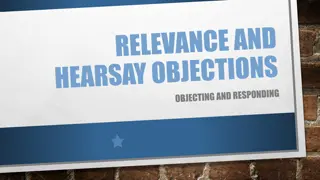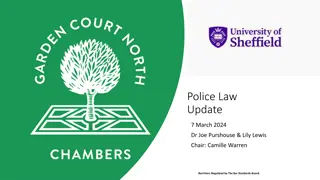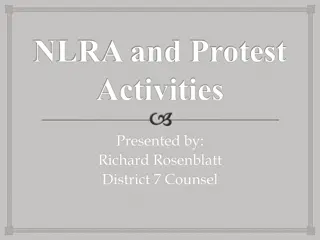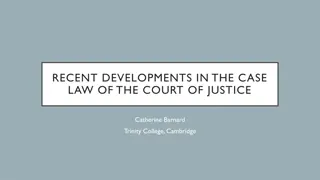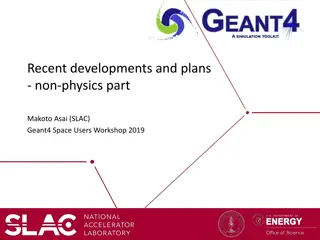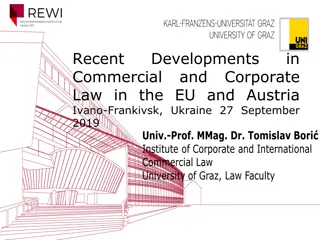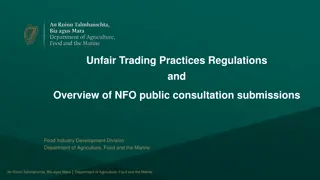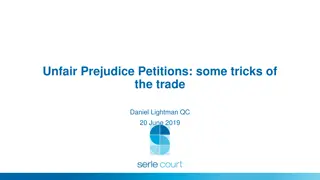Recent Developments in Unfair Preferences Law
The law on unfair preferences, particularly under Section 588FA of the Corporations Act, addresses transactions where a company favors a creditor, resulting in the creditor receiving more than they would in a winding up process. Recent cases like Cant v. Mad Brothers and Re Emanuel highlight the complexities and outcomes related to unfair preferences, emphasizing the importance of proof and direction in third-party payments.
Download Presentation

Please find below an Image/Link to download the presentation.
The content on the website is provided AS IS for your information and personal use only. It may not be sold, licensed, or shared on other websites without obtaining consent from the author.If you encounter any issues during the download, it is possible that the publisher has removed the file from their server.
You are allowed to download the files provided on this website for personal or commercial use, subject to the condition that they are used lawfully. All files are the property of their respective owners.
The content on the website is provided AS IS for your information and personal use only. It may not be sold, licensed, or shared on other websites without obtaining consent from the author.
E N D
Presentation Transcript
Cant v Mad Brothers - Recent developments in the law relating to unfair preferences 23 JUNE 2021 STEPHEN V. PALMER STEPHEN V. PALMER
Section 588FA The Plaintiff has the onus of proof of establishing a claim under s 558FA. Section 588FA of the Corporations Act provides: Unfair Preferences (1) A transaction is an unfair preference given by the company to the creditor of the company, if, and only if: (a) the company and the creditor are parties to the transaction (even if someone else is also a party); and (b) the transaction results in the creditor receiving from the company, in respect of an unsecured debt that the company owes to the creditor, more than the creditor would receive from the company in respect of the debt if the transaction were set aside and the creditor were to prove for the debt in a winding up of the company; even if the transaction is entered into, is given effect to, or is required to be given effect to, because of an order of an Australian court or a direction by an agency.
Third party payments Payment by direction cases - Re Emanuel (No 14) Pty Ltd (in liq), Macks v Blacklaw & Shadforth Pty Ltd (1997) 147 ALR 281( Re Emanuel ); Federal Commissioner of Taxation v Kassem and Others (2012) 205 FCR 156( Kassem ). Payment not received from the debtor - Hosking v Extend N Build Pty Ltd (2018) 357 ALR 795 ( Hosking ).
Cant v Mad Brothers Cant v Mad Brothers decisions Re Eliana Construction and Developing Group Pty Ltd (No. 1) [2018] VSC 833 1 November 2018, Efthim As.J( Eliana No. 1 ); Re Eliana Construction and Developing Group Pty Ltd (No. 2) [2019] VSC 546, 19 August 2019, Robson J( Eliana No. 2 ); Cant v Mad Brothers Earthmoving Pty Ltd [2020] VSCA 198, 13 May 2020, Beach, McLeish and Hargrave JJA ( Cant v Mad Brothers ).
Payments by direction In Re Emanuelthe company obtained finance to build a road and engaged Blacklaw to build the road: Blacklaw issued progress claims and then a statutory demand; The company was also in default with its financier and litigation ensued but was settled upon the parties entering a deed of settlement; Under the deed of settlemenr the company agreed to transfer various properties to the financier and the financier agreed to transfer various amounts to the company; and the financier also agreed to pay, at the direction of the Emanuel Group, to Blacklaw the sum of $322,313.54 for work performed for the Emanuel Group ; The company subsequently went into liquidation and the liquidators succeeded in recovering the funds from Blacklaw as an unfair preference.
Re ReEmanuel Emanuel The Full Court of the Federal Court held that : notwithstanding that the financier had paid the monies directly to Blacklaw, the transaction resulted in the creditor receiving from the company more than it would have if Blacklaw had to prove in the winding up; Emanuel provided to Blacklaw and Blacklaw received from Emanuel the actual benefit of a valuable chose in action owned by Emanuel secured to Emanuel by the deed; Under the deed, the company had a chose in action against the financier, and should the financier fail to pay the monies to Blacklaw as directed by the company, the company had the right to sue the financier to enforce the chose in action: The actual benefit took the form of a monetary payment which partially discharged the company s debt.
Re Emanuel Emanuel (cont.) Bathurst CJ later observed in Hosking, that Emanuelis essentially authority for two unsurprising propositions - First, an agreement for consideration between a debtor company and a third party by which the third party is required to pay funds to a creditor of the debtor company and does so pursuant to a direction by the debtor company can constitute a transaction within the meaning of that expression under s 9 of the Corporations Act Secondly, a payment to the creditor pursuant to a direction of the debtor company with which a third party is contractually bound to comply is a payment from the debtor company for the purpose of s 588FA(1)(b) of the Act.
Kassem Kassem: another payment by direction case In Kassem the liquidators of Mortlake brought proceedings against the ATO to recover payments made by a related company, Antquip. The common director and shareholder of Mortlake and Antquip transferred $40,000 from Antquip s bank account to the integrated client account established by the ATO for Mortlake. The court held the payments were loans made by Antquip to Mortlake, being funds advanced by Antquip to Mortlake that were paid to the ATO at Mortlake s direction. The Full Court of the Federal Court agreed with the trial judge that this was a clear example of a lender paying moneys advanced to a creditor of a borrower in accordance with the borrower s directions; Even if the transaction was not a loan, the payment by Antquip to the ATO was a payment that was made by or on behalf of Mortlake. The Full Court considered that the case was no different from that which would apply if Mortlake had borrowed the funds on overdraft from its bank and paid the creditor with those funds. The question left open in Kassem (as noted in Hosking) was whether it was necessary for there to be a diminution in the debtor company s assets for a transaction to constitute an unfair preference under s 588FA(1)
Emanuel Emanuel & Kassem good law Kassem remain Both Emanuel and Kassem are straightforward examples where: the monies paid by the third party payer to the creditor are plainly received from the company, because they are moneys to which the company is entitled, being monies owned by the company, or being paid out of an asset to which the company was entitled; and the benefit of the payment is received by the creditor from the company, at its direction.
Hosking Hosking In Hosking, Built NSW Pty Ltd ( Built ) as head contractor entered into a contract with Evolvebuilt Contracting Pty Ltd ( Evolvebuilt ) as sub-contractor to undertake works on a project in Sydney. Evolvebuilt entered into subcontracts with secondary sub-contractors. The head contract provided that Built could pay the secondary subcontractors directly; A building dispute arose between Built and Evolvebuilt. As Evolvebuilt was not being paid by the head contractor, it did not pay its subcontractors, who stopped work on the project; Evolvebuilt made a request under the head contract for Built to pay the subcontractors but Built terminated the contract instead; and following an arrangement with the CMFEU Built paid the secondary subcontractors directly; Evolvebuilt served a payment claim on Built under the Building and Construction Industry Security of Payment Act 1999(NSW); but on adjudication, the head contractor was determined to have no liability to Evolvebuilt.
Hosking Hosking (cont) The liquidators of Evolvebuilt sought to recover the moneys paid by Built to the secondary subcontractors as unfair preferences. The primary judge, Brereton J, considered that the critical question was whether the secondary subcontractors received the payments from the company . His Honour reasoned: That the section is concerned with payments made by and received from the company is plain from those words, but is confirmed by the terms of s 588FF(1)(a) which provides that, where, on the application of a company s liquidator, a court is satisfied that a transaction of the company is voidable because of section 588FE, the court may, inter alia make an order directing a person to pay to the company an amount equal to some or all of the money that the company has paid under the transaction It is also supported by the policy and purpose of provision for the recovery of unfair preferences, which is to ensure that the unsecured creditors are not prejudiced by the disposition of assets in a period shortly before the commencement of a winding up which would have the effect of favouring certain creditors. A payment made by a third party which does not come out of the company s assets does not offend that policy.
Hosking Hosking (cont.) On appeal the NSW Court of Appeal held that for a transaction to constitute an unfair preference within the meaning of s 588FA(1) it must be established that; the debtor company and the creditor were parties to the transaction; the transaction must result in the creditor receiving from the company . than the creditor would receive from the company if the transaction was set aside. it was necessary to identify a transaction to which Evolvebuilt was a party before the payment could be held to be a voidable transaction under s 588FA(1).
Hosking osking (cont.) The liquidators argued that Evolvebuilt had requested Built pay the secondary subcontractors and that the requests were part of a chain of causation which resulted in the payments being made. The Court of Appeal held that it was not helpful to refer to a chain of causation but that it was necessary to identify a transaction and then whether Evolvebuilt was a party to it. The Court of Appeal upheld Brereton J s decision that: (i) Evolvebuilt was not a party to the transaction by which payments were made by Built to the secondary subcontractors, (ii) Built was under no contractual obligation to Evolvebuilt to make the payments to the secondary subcontractors, and (iii) Evolvebuilt was not a party to the arrangement between Built and the CMFEU.
Good faith defence The Defendant bears the onus of proof of establishing the defence. Section 588FG(2) of the Corporations Act provides that: (2) A court is not to make under section 588FF an order materially prejudicing a right or interest of a person if the transaction is not an unfair loan to the company, or an unreasonable director-related transaction of the company, and it is proved that: (a) the person became a party to the transaction in good faith; and (b) at the time when the person became such a party: (i) the person had no reasonable grounds for suspecting that the company was insolvent at the time or would become insolvent as mentioned in paragraph 588FC(b); and (ii) a reasonable person in the person s circumstances would have had no such grounds for so suspecting; and (c) the person has provided valuable consideration under the transaction or has changed his, her or its position in reliance on the transaction.
The subjective and objective tests of good faith under s 588FG(2) InRe Evolvebuilt Pty Ltd [2017] NSWSC 901 Brererton J set out a summary of the applicable principles by reference to Re Alsafe Security Products Pty Ltd atf Alsace Trust (in liq) where Black J said that: The test under s 588FG(2)(b)(i) is hybrid in character, since it is directed to whether the particular creditor, with its perspicacity, the information available to it, and with any analysis of that information that it had made, had no reasonable grounds for suspecting insolvency at the relevant time, and the requirement for no reasonable grounds is objective in character The test under s 588FG(2)(b)(ii) is objective in character, and the Court is directed to whether a reasonable person in the creditor s position, using the information reasonably available in those circumstances and making the analysis of that information which a reasonable person would make, would have had reasonable grounds to suspect the debtor s insolvency
The facts in Cant v Mad Brothers Brothers Cant v Mad Mad Brothers operated an earthmoving business; Eliana was a builder; Rock Developments (Rock) was a property developer; Magdy Sowiha was a director and shareholder of both Eliana and Rock; Rock engaged Eliana as builder on various projects; Mad Brothers had performed earthmoving work at various sites at the request of Eliana; As at March 2016 Eliana was indebted to Mad Brothers for $236,952.31;
The facts of Cant v Mad Brothers Brothers (cont.) Cant v Mad Included in the debt was an amount of $87,256.16 for work Mad Brothers performed at 7 Ingram Place, Taylors Hill, which was owned by Rock. There was no building contract produced between Rock and Eliana for work at that site; Mad Brothers engaged solicitors to pursue the debt. A creditors statutory demand was served on Eliana, which it did not comply with or take steps to set aside. Mad Brothers then commenced winding up proceedings against Eliana; Eliana contested the winding up proceedings claiming that it was solvent and filed a large amount of material, including affidavits sworn by Sowiha and Eliana s accountant, directed to proving its solvency; The winding up proceeding was settled pursuant to a deed, which provided that Eliana would pay Mad Brothers $220,000; Rock had applied for a large loan facility from NWC Finance for its own purposes;
The facts of Cant v Mad Brothers Brothers (cont.) Cant v Mad Under cross-examination Sowiha was asked whether he had directed NWC to pay Mad Brothers. Sowiha denied this and said that NWC had insisted that, as a condition of the loan facility advanced to Rock, the debt to Mad Brothers be paid. The sum of $220,000 was drawn from the facility NWC made available to Rock and paid directly by NWC to the trust account of the solicitor for Mad Brothers; Eliana was not a borrower under the loan agreement with NWC; Shortly after the payment Sowiha placed Eliana into external administration and it was later placed into liquidation.
Cant v Mad Brothers Cant v Mad Brothers - the liquidator s claim The liquidator brought proceedings against Mad Brothers claiming the payment was an unfair preference payment; The liquidator pleaded that the payment was made by Eliana because it had authorised the payment. The authority was alleged to be inferred from the fact that Sowiha was the director of both companies. Alternatively, the liquidator alleged that Rock was indebted to Eliana and that the payment reduced Rock s indebtedness to Eliana; Significantly, Eliana did not plead or run its case on the basis that Eliana had borrowed the money from Rock. It was never part of the liquidator s case that Rock had made a loan to Eliana to enable it to pay the debt.
Cant v Mad Brothers Cant v Mad Brothers - Mad Brothers defences Mad Brothers defended the proceeding on the grounds that: (a) it was not an unfair preference payment because Eliana did not make the payment; (b) part of the payment included payment for work performed at the Ingrams Road site for which Rock was liable to pay Mad Brothers, in any event, as an undisclosed principal; (c) Mad Brothers had received the payment in good faith and in circumstances where neither it nor a reasonable person in its position would have reasonable grounds to suspect insolvency.
Cant v Mad Brothers Cant v Mad Brothers - the decisions In Eliana No. 1Associate Justice Efthim found against Mad Brothers on all points. Mad Brothers successfully appealed from the decision. Robson J overturned the decision of Associate Justice Efthim and found for Mad Brothers on all points - ( Eliana No. 2 ). The liquidator appealed from the decision of Robson J to the Court of Appeal which dismissed the appeal. In Cant v Mad Brothers the Court of Appeal held for Mad Brothers on its first two points and held that therefore did not have to decide the good faith defence but indicated that it would not have found for Mad Brothers on that point.
Cant v Mad Brothers Cant v Mad Brothers - was the payment an unfair preference? Ultimately the case turned on the question of whether the payment that was received by Mad Brothers came from Eliana. The liquidator pleaded that Eliana had authorised the payment and that this was all that was needed to establish that the payment came from Eliana. In the alternative the liquidator said that Rock was indebted to Eliana and that the payment reduced that indebtedness and that therefore the payment came from Eliana. The Court of Appeal accepted Mad Brothers argument that the payment was not received from Eliana. The Court of Appeal accepted that while mere authority or ratification of the payment by Eliana was sufficient to make Eliana a party to the transaction, it did not establish that the payment was received from the company.
Cant v Mad Brothers Cant v Mad Brothers - was the payment an unfair preference? (cont.) The facts did not support the liquidator s alternative argument that Rock was indebted to Eliana. To the contrary, Eliana s accounts recorded that Eliana was indebted to Rock. The liquidator failed to make out its case as pleaded and run, and the factual findings made by Associate Justice Efthim which Robson J had found to be incorrect were not disturbed by the Court of Appeal. It was simply the fact that Eliana did not pay anything to Mad Brothers. The funds that Mad Brothers received did not come from Eliana. Eliana did not borrow the funds that were applied to make the payment, either from Rock or NWC, and it and had no entitlement to them. If the liquidator had been allowed to recover the funds which Eliana had not paid in the first place this would have resulted in a windfall for creditors. The Court of Appeal found that this was not a case of payment by direction and that those decisions could be put to one side.
Cant v Mad Brothers Cant v Mad Brothers - was the payment an unfair preference? (cont.) Accordingly the Court of Appeal did not disapprove of the decisions in Re Emanuel or Kassem and those cases are still good law. At paragraph 120 of its decision the Court of Appeal summarised its conclusions as follows: (a) the words given by a company in s 588FA(1) do not form part of the definition of an unfair preference and are merely descriptive of the position when the elements of the definition in (a) and (b) are met; (b) a company may be a party to a transaction for the purposes of s588FA(1) as a result of giving a third party a direction to make a payment to a creditor, or by authorising or ratifying such a payment. However, this does not necessarily mean that the payment is received from the company; (c) that the words from the company in s 588FA(1)(b) operate so as to retain the requirement under the previous law that the preference must be received from the company s own money, meaning money or assets to which the company is entitled;
Cant v Mad Brothers Cant v Mad Brothers - was the payment an unfair preference? (cont.) (d) it is necessary, in order for a preference to be from the company that the receipt of it by the creditor has the effect of diminishing the assets of the company available to creditors; (e) on the other hand a payment by a third party which does not have the effect of diminishing the assets of the company available to creditors is not a payment received from the company and is therefore not an unfair preference.
Cant v Mad Brothers Cant v Mad Brothers applied In the matter of Western Port Holdings Pty Ltd (receivers and managers appointed) (in liq) [2021] NSWSC 232 (12 March 2021)(Rees J) ( Western Port Holdings ) 11 payments made to the ATO by a third party were in dispute. One of the issues in dispute was whether the third party payments were received from the company within the meaning of s 588FA(1)(b) as recently considered in Cant v Mad Brothers, The liquidators challenged the conclusion in Cant v Mad Brothers that a payment by a third party which does not have the effect of diminishing the assets of the company available to creditors is not a payment received from the company and is therefore not an unfair preference Rees J expressed some disquiet with the reasoning in Cant v Mad Brothers
Cant v Mad Brothers Cant v Mad Brothers applied (cont.) However, Rees J held that the conclusion in Cant v Mad Brothers was open in the circumstances where the question had been left open in Kassem and Hosking, Her Honor held that she was not entitled to depart from a considered judgement of an intermediate appellate court simply because she might prefer a different view: N & M Martin Holdings Pty Ltd v Commissioner of Taxation [2020]FCA 1186 at [43]-[45]
